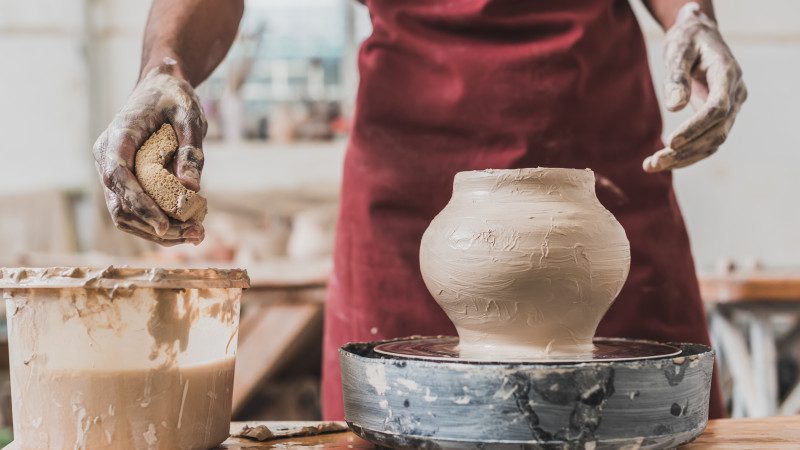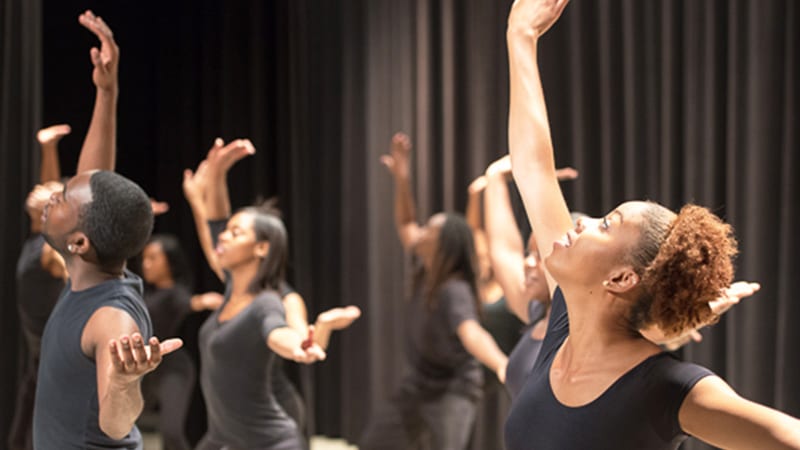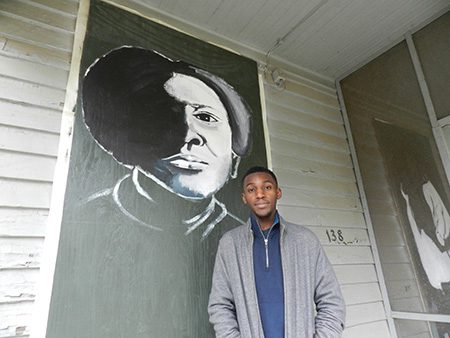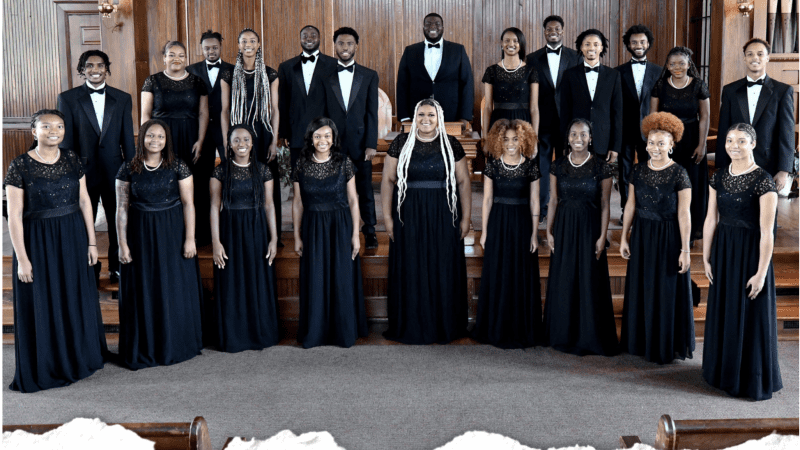How Careers in Art Can Empower Marginalized Voices and Drive Social Change

Art has always been a powerful tool for storytelling, cultural expression, and social transformation. For African American students, art serves as both a medium for self-expression and a catalyst for social change. From historical movements to contemporary initiatives, art amplifies marginalized voices, fostering empowerment and equity in education and society.
Whether you aspire to a professional career in arts or fine arts or simply want to cultivate a lifelong passion, majoring in fine arts offers a rewarding and fulfilling experience.
Students of color have played a vital role in shaping this field, contributing invaluable perspectives and creativity from the Harlem Renaissance to the Black Arts Movement and beyond. Their talent has left a lasting imprint on the American landscape through iconic landmarks, monuments, paintings, music, films, fashion, and architecture — and you can build on that legacy.
The Need for More Black Americans in Arts Disciplines
A 2020 report found that Black Americans are less likely than other groups to participate in the arts as traditionally defined by Eurocentric history and practices. The findings may be partly due to the narrow cultural scope of these definitions. This reality, combined with broader racial disparities in arts professions, underscores that increasing Black representation in the arts is not just about numerical diversity. It’s essential for broadening our cultural landscape and driving meaningful social change.

Claflin College
The Importance of Representation
Representation in the arts is vital in empowering current and future Black artists. It provides individuals with the agency to shape their own narratives and cultural identities, helping to challenge racist stereotypes in art and popular culture. Additionally, it fosters the growth of more inclusive artistic traditions and disciplines. As Black artists gain visibility and recognition in creative fields, they inspire broader communities to reflect on, explore, and celebrate diverse expressions of Black identity.
The Role of Art in Empowerment
Art allows individuals to explore their identities, share personal narratives, and challenge systemic injustices. Research highlights the benefits of art education for marginalized students, showing how creative expression enhances self-confidence, resilience, and academic achievement.
Art as a Catalyst for Social Change
Historically, many African American artists have used their craft to fight for civil rights and social justice. Art has traditionally been crucial in shaping public discourse and advocating for change. Publicly displayed or performed art, from murals to poetry and digital media, can play an immediate and active role in highlighting racial injustices and inspiring action. All forms can inspire deep thought and progress.
Art as a Tool for Self-Expression
African American students often face racial biases and systemic barriers in education. Art provides a medium to express their unique experiences and emotions without fear of judgment. A National Endowment for the Arts study found that students who engage in the arts are likelier to excel academically and participate in civic engagement.
Art and Academic Success
Studies link engagement in the arts to higher graduation rates and improved cognitive skills. A report from the Brookings Institution found that students with access to arts education perform better in reading and math, develop critical thinking skills, and are more engaged in school. For African American students, culturally relevant art programs help bridge the gap in educational disparities by fostering a sense of pride and belonging.
Exploring the Fields of Art
The arts encompass a vast and diverse range of disciplines, each with its unique forms of expression. Some of the most prominent branches include:
- Fine Arts: Fine arts, which focus on artistic creation for aesthetic and expressive purposes, include traditional visual forms such as painting and sculpture. Programs in this field explore historical influences and the technical skills essential for creating museum-ready artwork.
- Performing Arts: This category encompasses art forms designed for live audiences, including dance, music, theater, and stand-up comedy. Students in performing arts programs develop their craft through technique, practice, and performance experience.
- Design: This field encompasses graphic, industrial, interior, and user interface (UI) design, among others. It blends artistic creativity with functionality. Designers strive to create visually appealing and practical solutions for everyday objects, tools, digital interfaces, and spaces.
Pursuing a bachelor’s degree in art or fine arts is essential for those aspiring to careers in these artistic fields. These programs provide a comprehensive education, covering a wide range of relevant subjects, including:
- Ceramics
- Drawing
- Painting
- Foreign languages
- Graphic design
- Art history
- Theater
- Stage design
- Sculpting
- Music theory
- Acting
- Directing
- Western art
HBCUs Can Help You Start a Career in the Arts
Given the recent Supreme Court ruling on affirmative action in college admissions, more Black students will likely turn to historically Black colleges and universities (HBCUs) for their education. These institutions will do everything they can to meet increased student demand. HBCUs help more students earn college degrees, compete successfully for well-paying jobs in competitive career fields, improve workforce diversity, and increase upward economic mobility.
People of all ages, races, and life paths can help improve diversity in American arts disciplines by supporting scholarships and other funding for HBCUs with related programs. By donating today, you can make a difference in the lives of arts students in one easy step.
Careers in the Arts
Many majoring in the fine or performing arts will pursue traditional careers as painters, sketch artists, sculptors, actors, dancers, composers, and musicians. However, a degree in art will also prepare you for other professions, including:
- Art teacher
- Video editor
- Interior designer
- Art therapist
- Art director
- User experience (UX) designer
- Multimedia artist or animator
- Director
- Set designer
- Creative director
- Fashion designer
- Stage manager
Want to learn more about this possible career path and college major? Have questions about which UNCF colleges and universities offer degrees in the fine and performing arts? Looking for help with financing this degree?
Click Here so We can Help You!
How to Prepare for Success
Aspiring artists should routinely practice their techniques within their chosen medium. They should be interested in the overall history of their medium, both in the US and abroad. Finally, artists should consider the future of their discipline in an increasingly digital world, and how they might innovate and adapt within it.
Artists should be creative, expressive, and resourceful. They should also be excellent communicators, team players, and networkers. They should prepare to function in supporting roles and take on those in the spotlight. Artists should also seek advice and guidance from arts professionals.

Xavier Carroll, Tougaloo student
Schools to Consider
These UNCF-member schools and others offer programs for students wishing to work in the arts:
- Xavier University of Louisiana
- Johnson C. Smith University
- Clark Atlanta University
- Tougaloo College
- Tuskegee University
- Spelman College
- Johnson C. Smith University
- Claflin University
- Virginia Union University
- Oakwood University
- Talladega College
Professional Organizations
Numerous organizations in various arts offer more insight into working in those fields. A sample list includes:
- Americans for the Arts
- Association of Performing Arts Professionals (APAP)
- National Art Education Association (NAEA)
- Association of Art Museum Curators (AAMC)
- The International Association of Blacks in Dance (IABD)
- Association of Professional Art Advisors (APAA)
- College Art Association (CAA)
- Organization of Black Screenwriters (OBS)
- League of Professional Theatre Women (LPTW)
- National Opera Association (NOA)
- National Dance Society (NDS)
- American Federation of Musicians (AFM)

Tougaloo College
Scholarships Available
There’s no better way to start your path to a successful arts and fine arts career than with a solid financial foundation. Fortunately, many scholarships are available through UNCF. Keep an eye on the UNCF website for current scholarship opportunities and announcements.
You can search for specific scholarships and view those currently accepting applications here. Students should also check with each college, university, and professional organization to see if additional scholarships are available for studying the arts and fine arts.
As you explore your options, use our guide to apply for scholarships and grants. You can also receive guidance by submitting a major interest form if you are interested in a career in arts and fine arts. Submit the form on our website to get started. Follow us on UNCF’s social media channels to receive notifications about our scholarships and member HBCUs. Reach out today!
Contributing to UNCF member schools shows your support for students pursuing arts and fine arts careers to create a better and just world. Education is the greatest tool for creating a just and equitable society where truth reigns and economic mobility is available to all. Help us achieve this future by donating today!
- Clark Atlanta University
- Johnson C. Smith University
- Oakwood University
- Shaw University
- Spelman College
- Stillman College
- Talladega College
- Tougaloo College
- Tuskegee University
- Virginia Union University
- Wiley University
- Xavier University of Louisiana
- Feature Article
- Career Ideas
- Funding Your Degree
- HBCUs
- Member HBCUs